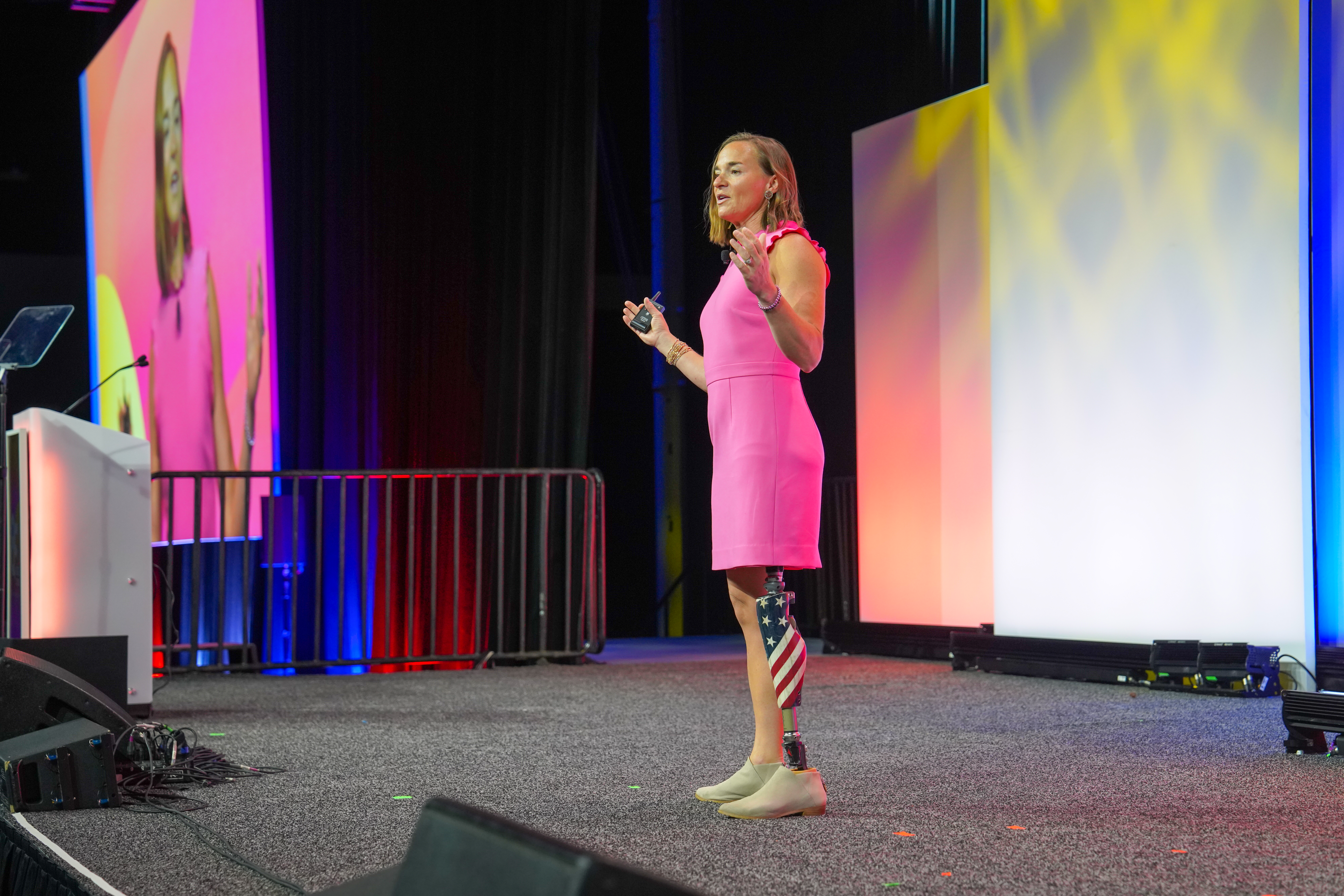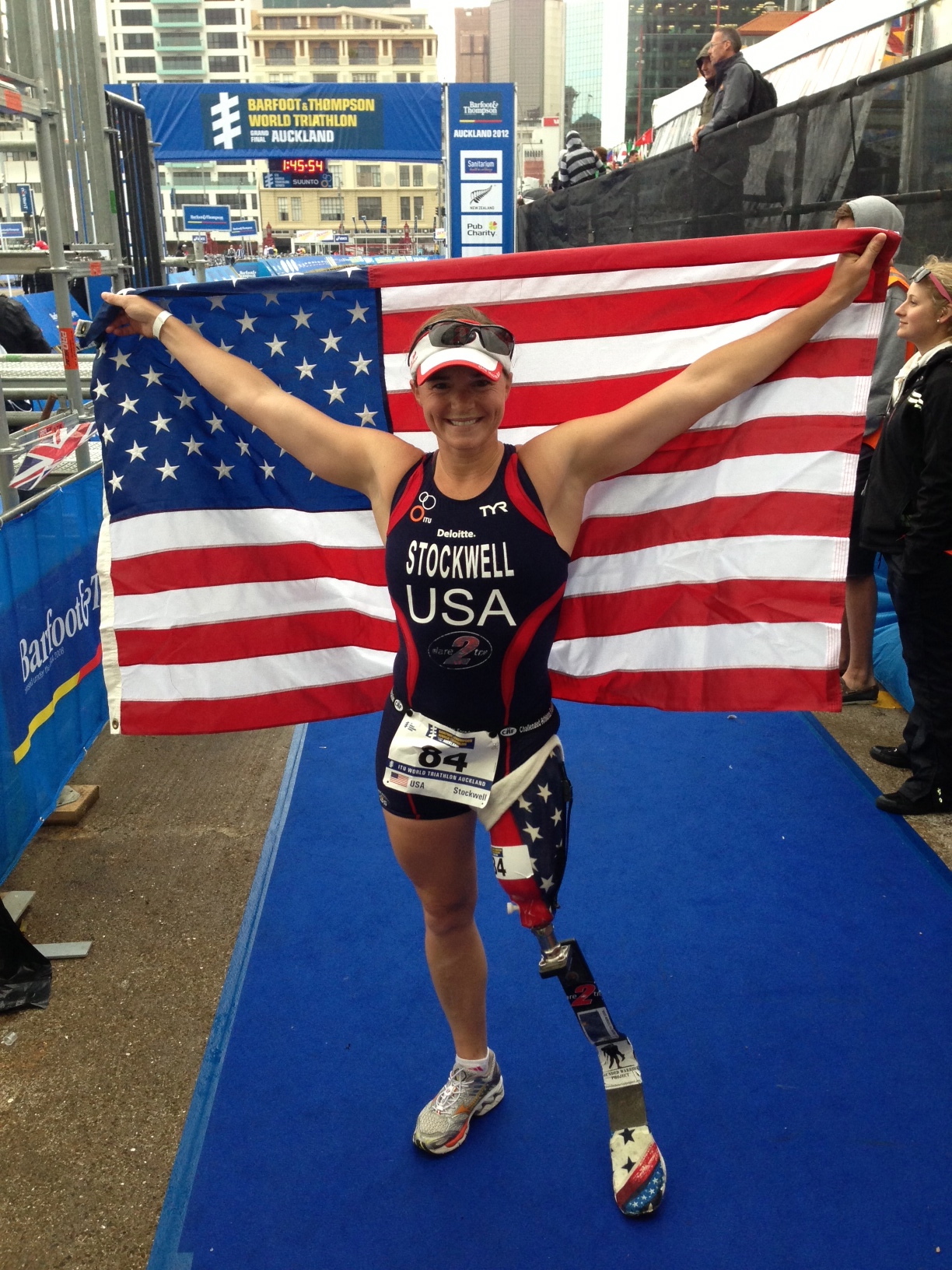U.S. Army veteran and four-time Paralympian Melissa Stockwell delivered her message of perseverance with school board members at NSBA’s annual conference
Surviving a near-fatal war injury convinced Melissa Stockwell that we don’t give ourselves enough credit for the things that we’re capable of doing, even though we sometimes have to dig deep to find our personal pocket of potential.
July 14, 2025
 MELISSA STOCKWELL SPEAKS FROM THE STAGE OF THE 2025 NSBA ANNUAL CONFERENCE.
MELISSA STOCKWELL SPEAKS FROM THE STAGE OF THE 2025 NSBA ANNUAL CONFERENCE.
PHOTO CREDIT: NSBA
Melissa Stockwell is not only a decorated U.S. Army veteran, four-time Paralympian and bronze medalist, and three-time world champion paratriathlete, but she also is a powerful advocate of choosing to find the positive, even in the darkest of times.
That’s a life lesson that the former Army transportation officer learned after she lost her leg to a roadside bomb while serving in Iraq in 2004. Following her recovery from the near-fatal injury, Stockwell became determined to live a life of adventure, joy, and service to others.
Today, the elite athlete, wife, and mother of two is a motivational speaker, author of the book The Power of Choice: My Journey From Wounded Warrior to World Champion, and co-founder of the nonprofit Dare2tri. The organization has helped hundreds of people living with disabilities not only find confidence in sport but, more importantly, to recover their self-esteem and a renewed passion for living.
Stockwell’s message of perseverance and embracing “the power of choice to live the life that we all want to live” uplifted and inspired attendees as she gave the opening keynote presentation at NSBA’s 2025 Annual Conference in Atlanta in April. The following are excerpts from Stockwell’s address:
On April 13, 2004, I woke up with both of my legs, and I went to sleep that night with just one of them. For any of you who have your to-do lists that you make throughout the day that you like to check off, I can assure you that that was not on my to-do list for the day. It wasn’t part of my life plan either. But that’s kind of the beauty of life. You never know what it will throw at you until it does.
I knew that my chosen profession as a military officer had its risks, but you never think that something like losing a leg is going to happen to you, until it does. On that fateful day, I woke up early like I did every day over in Iraq. I put my uniform and Kevlar bulletproof vest on, weapon in hand, and we got our day’s mission. It was similar to the other missions I had been on. The big difference was that instead of sitting in the front seat next to the driver, I was sitting behind the driver. I was doing what they called a ride-along to learn the route for the next day when I was going to lead the route.
About 10 minutes into our ride, we were going right into central Baghdad. We came upon an underpass, and there was this deafening boom. There was black smoke, the smell of metal, the windshield crashed in. A soldier in front yelled, ‘IED! IED!’ which we all knew meant our vehicle had been struck by a roadside bomb.
As I started to take my seatbelt off, I looked down and knew that something wasn’t right. There was a lot of blood. Lucky for me, a combat lifesaver by the name of Sgt. Pavich, trained in field first aid, was a few vehicles back. He put a tourniquet on my leg and saved my life.
After being put on a helicopter and flown to the nearest aid station, I was rushed to an emergency hospital and what I was later told was a lifesaving surgery. It wasn’t until I woke up from that surgery and looked to the gentleman next to me that I said, ‘Did something happen to my leg?’
In a very blunt, military way, he said, ‘You don’t have it; your leg is gone.’
I feel like, all these years later, what I should have said was, ‘Well, can you look again?’ It seems surreal that in a second, an entire leg is gone. I had no choice in the matter.
But I had a choice. Life. It’s all about choices. So first, I had to move on. Physically, from the hospital bed in Baghdad, I flew to the Landstuhl Regional Medical Center in Germany, which was where all the severely wounded soldiers went from Iraq and Afghanistan before making the long trip to Walter Reed Army Medical Center in Washington, D.C.
When I was able to come out of my hospital room at Walter Reed and look around, I saw soldiers missing two, three, four limbs. Some had lost their eyesight; some had traumatic brain injuries. I looked at myself and thought, ‘Holy cow. I’m the lucky one.’ One leg. That was it. I had three good limbs, my mind, my eyesight, not to mention my life, because too many continue to give and had given that ultimate sacrifice. I made a promise then to live my life for those who no longer could.
While in physical therapy at Walter Reed, I worked to regain the strength I had lost. And then the day came when I was fitted for my very first prosthetic leg. A few days later, they seated me in the parallel bars. They hand you this piece of metal and plastic, and say, ‘Now, this is your leg, and you’re going to walk with this.’ I remember thinking, this is not my leg, and how am I going to walk with this thing? I stood up, I looked across the physical therapy gym, and I saw another veteran missing both of his legs and an arm.
And guess what he was doing? He was walking. Perspective in life is everywhere. So what do you do? Well, you walk. First it was in the parallel bars, and then using crutches, and then a cane. And then the day came where I realized that my life would go on. The only difference is that every day I’d wake up, I’d put my prosthetic leg on, and I’d go about my day just like all of you. Then I would take it off at night. But as soon as I learned to walk, I wanted more.
I had been an athlete when I was younger, and I would lie in that hospital bed wondering if I could still be an athlete. The sweat on my face, the thrill of a finish line. So, even more exciting than learning to walk is what I like to call the start of Melissa Stockwell 2.0. There were these organizations at Walter Reed whose mission was to come into the hospital and get us out doing things that we never thought we’d do with both legs, much less with one.
Taking every opportunity I could, a few months after losing my leg, I was in New York City doing a marathon on a bike that I powered with my arms. A few weeks later, I was in Colorado. After growing up skiing on both legs, this time it was relearning how, with one leg. Back on the bunny hill, wobbly, falling everywhere.
But by the end of the week in Colorado, flying down the mountain, the wind in my face, I had never felt so free. Going back to Walter Reed, I thought, if I can do that, I can do anything.
This came at a perfect time because someone came and gave a presentation about the U.S. Paralympics. A gentleman with a booming voice said, ‘If you train hard enough, if you dedicate yourself to a sport, then you can compete on the world’s biggest athletics stage as somebody with a disability.’
As a young gymnast who had dreamt of the Olympics, I sat in that room thinking, oh my gosh, I have a second chance. I left knowing that somehow, some way, I was going to be a Paralympian. But first, I was medically retired from the military, went back to school, and studied a new career in the field of prosthetics, learning how to fit other amputees with artificial limbs. That reward of getting somebody up and back on their feet and showing them what they could do never gets old. But in my mind, this idea of being a Paralympian was always in the front of my mind.
I can honestly tell you that I have done more in my life with one leg than I ever would have done with two. And then there are the people I have met, the opportunities I have had.
 MELISSA STOCKWELL HAS SET RECORDS IN MARATHONS AND COMPETED IN IRONMAN COMPETITIONS.
MELISSA STOCKWELL HAS SET RECORDS IN MARATHONS AND COMPETED IN IRONMAN COMPETITIONS.
PHOTO COURTESY OF MELISSA STOCKWELL
For me, April 13 is a day of reflection because when I think back on the last many years, I have had some pretty incredible moments in my life. But out of all these things, what I am most proud of is giving back because I wouldn’t be here if it weren’t for the people and organizations that helped me.
I’ve also come to realize that we don’t give ourselves enough credit for the things that we’re capable of doing. For me, the catalyst was losing a leg in order to reach into this pocket of potential I always had. I just had to reach a little bit deeper.
The question to all of you is, how do you skip the roadside bomb part and find your potential? You start by believing that you can. It sounds so simple, but it’s so powerful. When you come up on a situation and think, “there is no way I can do that, there is no way I can make a difference,” turn that narrative around and think, “actually, this little thing I’m going to do, this little piece of information I’m going to share, that could make a difference. I can do that.”
So, the next time things don’t go as planned or don’t go your way—which will happen—It might be as you walk out of this room tonight, it might be in a school, it might be at home, it might be in your personal life. Whatever it is, how are all of you going to choose to rise up? To rise up and continue to be the best version of yourselves? To continue to make an impact in your communities, in the nation, and to live the life that all of you deserve to live?
Michelle Healy is senior editor of American School Board Journal.